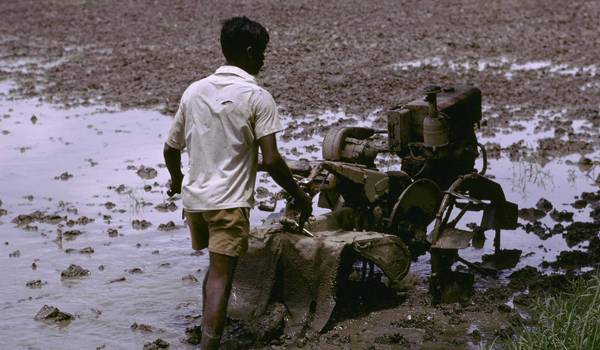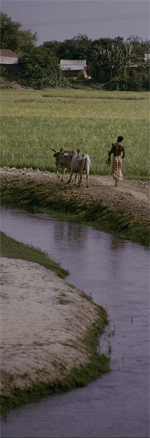
A mostly low-lying country located in South Asia, Bangladesh is home to one of the largest deltas in the world, formed by the dense network of the distributaries of the Ganges, the Brahmaputra and the Meghna Rivers. The most damaging effects associated with climate change in Bangladesh are floods, salinity intrusion and droughts that are found to drastically affect crop productivity almost every year. Climate change induced challenges include: scarcity of fresh water due to less rain and higher evapo-transpiration in the dry season; drainage congestion due to higher water levels as a result of sea level rise; river bank erosion; frequent floods and prolonged and widespread drought; and wider salinity in the surface, ground and soil in the coastal zone. The agricultural sector will also face significant yield reduction, endangering food grain self-sufficiency. It was found that the population living in the coastal area is more vulnerable than the population in other areas.
 |
Timelines of the NAPA preparation process in Bangladesh
| Funding for the preparation of the NAPA approved by the GEF |
April 2003 |
| GEF agency approval date |
December 2003 |
| NAPA preparation start |
November 2004 |
| Submission of the NAPA to the UNFCCC |
November 2005 |
NAPA projects under implementation
Bangladesh listed 15 priority activities in its NAPA, and its first project, already under implementation, is aimed at reducing the vulnerability of coastal communities to the impacts of climate change induced risks in four upazilas (subdistricts) in the coastal districts of Barguna and Patuakhali (western region), Bhola (central region), Noakhali (central region) and Chittagong (eastern region).
| Project title: Community-based adaptation to climate change through coastal afforestation |
| Implementing agency |
UNDP |
| National excuting agency |
Department of Forest, Ministry of Environment and Forests (MoEF) |
| Number of NAPA priority activities addressed |
1/15 |
| Cost in USD million (LDCF component/total cost) |
3.3/10.4 |
| First submission of the concept note (PIF) under the LDCF |
April 2007 |
| GEF CEO endorsement of the project |
December 2008 |
NAPA PROCESS
Preparation and implementation strategy: Stakeholder consultation was an integral part of the formulation of the NAPA, and the NAPA team was composed of a multidisciplinary group of experts. Six sectoral working groups were formed to analyse the vulnerability of the natural, economic and social systems, and meetings between these working groups and different sectoral agencies, departments, project authorities and donors were held to assess possibilities of integration into sectoral policies and plans.
Due to the country specificities, while ranking the priority activities, preference was given to activities that promote the safety and security of life and livelihoods, the active participation of local communities and risk reduction from natural hazards. The final NAPA text incorporated comments and suggestions made during a national consultation workshop and contained a profile of 15 potential projects demonstrating integration into national policy frameworks and programmes.
 |
Institutional arrangements in the country: Based on its experience in preparing the NAPA, Bangladesh has also taken steps to establish a national framework to address climate change issues in the country. Bangladesh set up a Climate Change Unit under the Ministry of Environment and Forests (MoEF), and developed the Bangladesh Climate Change Strategy and Action Plan (BCCSAP) in 2008, which was revised in 2009.
The Government of Bangladesh also created a Climate Change Trust Fund (CCTF) in 2009. The CCTF has approved 43 government projects for implementation, and a total of USD 70 million has been allocated to these projects. CCTF has also approved around 32 projects of non-governmental organizations (NGOs). A total of USD 3.5 million has been allocated to these projects, and a number of other government and NGO projects are in the process of being considered.
In addition to CCTF, the country has also established a Bangladesh Climate Change Resilience Fund (BCCRF) with support from development partners. BCCRF will be managed and implemented by the Government and technical assistance will be provided by the World Bank. Development partners have already pledged USD 113.5 million to this fund.
The Government of Bangladesh is also working on setting up a Multi-Donor Trust Fund (MDTF) for receiving and disbursing adaptation funds.
Experience with project implementation: Bangladesh has extensive experience in involving local communities in forest protection and regeneration, and its first NAPA project draws on that experience. In addition, the project will be linked with regional and national programmes, such as the UNDP/Department for International Development (DFID) Comprehensive Disaster Management Programme (CDMP) and UNDP programmes such as the Coastal and Wetland Biodiversity Management Project and the Empowerment of Coastal Fishing Communities for Livelihood Security. |
Revision and update: Bangladesh updated its NAPA in 2009, incorporating the findings of studies on impacts and vulnerabilities, and an adaptation needs assessment carried out over the last few years. The six working groups that participated in the preparation of the original NAPA were engaged in this review. The revised NAPA has also been printed in the local language by MoEF and the Forum of Environmental Journalists of Bangladesh (FEJB).
| Bangladesh's experience shows that the NAPA process can be useful for establishing institutional arrangements to address climate change issues in the country. |